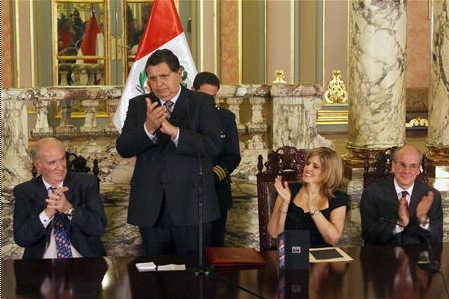
(above) Peru's President Alan Garcia (2nd L) claps next to (L-R) Peru's Foreign Minister Jose Garcia Belaunde, U.S. Ambassador to Peru Michael McKinley and Peru's Minister of Foreign Trade Mercedes Araoz during a ceremony to mark the Peru-U.S. Free Trade Agreement at the Government Palace in Lima January 16, 2009. (photo: REUTERS/Carolina Urra Andina/Handout)
U.S., Peru wrap up trade pact despite objections
January 17, 2009 - Reuters
By Doug Palmer
WASHINGTON (Reuters) - Leaders of the United States and Peru finalized a free trade agreement on Friday, just days before U.S. President George W. Bush leaves office and despite concerns about labor laws in the Andean country.
The action makes Peru the 17th free trade partner of the United States and the 14th country added to that list since Bush took office eight years ago. Two-way trade between the United States and Peru is about $9.4 billion annually.
"Today's proclamation marks an important milestone in our relationship with Peru, one of our strongest allies in Latin America," U.S. Trade Representative Susan Schwab said in a statement after Bush issued the order.
President Alan Garcia, at a ceremony in Lima, praised Peru's first trade deal with a major economy, and said it will help ease the impact of the global economic crisis.
"We've fulfilled a very important goal for our nation," said Garcia, a former socialist who has aggressively pushed free trade since taking office in 2006.
Peru, one of the world's fastest-growing economies, is also working on trade deals with Canada and China, among others.
Earlier this week, top Democrats on the House of Representatives Ways and Means Committee raised concerns that Peru had backtracked on important labor commitments and asked Bush not to implement the agreement before he leaves office on Tuesday.
Republican lawmakers and business groups hailed Bush's decision to implement the pact, effective February 1.
Congress approved the free trade pact more than a year ago, but Bush was required to certify that Peru had fulfilled certain requirements before it could go into force.
RUSH TO COMPLETION
The deal locks in and expands Peru's duty-free access to the United States that it has enjoyed since 1991 under a U.S. trade preference program for the Andean region.
In return, Peru immediately will eliminate duties on 80 percent of U.S. industrial and consumer products, including mining, agricultural and construction equipment.
Peru immediately will eliminate duties on more than two-third of U.S. farm exports such as wheat, high quality beef, fruits and vegetables, and other processed foods.
It also will open its services markets to U.S. companies and boost intellectual property rights protections.
Various environmental and development groups joined the AFL-CIO labor federation in a joint statement on Thursday urging the Bush administration not to certify the agreement "until it can be verified that all provisions to protect the environment, promote workers rights and ensure access to affordable medicines are in place."
To get Bush's seal of approval before he leaves the White House, Peru's Congress rushed this week to approve temporary powers for the Peruvian government to quickly bring its regulatory standards into compliance with the trade pact.
It also strengthened a law on protecting the Amazon rain forest to meet concerns raised by Washington.
Schwab's office renegotiated the agreement -- as well as three other pacts with Colombia, Panama and South Korea -- to add stronger labor and environmental provisions after Democrats captured control of Congress in November 2006.
Bush said earlier this week that Congress' failure to approve the three remaining pacts was one of the biggest disappointments of his second term.
(Additional reporting by Maria Luisa Palomino and Teresa Cespedes in Lima; Editing by Eric Walsh)